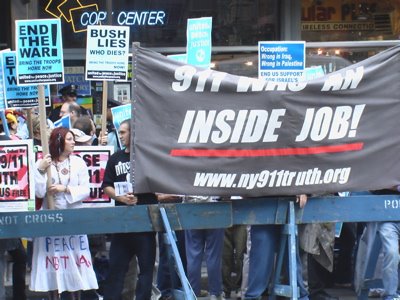The Bailout is dead. Long live the Bailout.
It seems to me this thing failed for the same reason the EU couldn't stuff its voluminous constitution down the throats of the Irish. (No, I'm not saying the CIA got involved.) The whole plan is inscrutable to the average voter. No matter which way you hold it up to the light, it looks like a very large hat being passed around for the purpose of saving the asses of bankers who deserve our disdain (and perhaps prison) more than our charity. The last-minute attempt to change the name on the hat from "Bailout" to "Rescue" didn't make much difference to those being asked to open their wallets.
The legislators who voted against the bailout cited their political survival as the main reason. Which translates into: "We couldn't sell this piece of junk to our electorates." It did not help that we never got a straight answer on how this massive belt-tightening was not going to end up merely guaranteeing this Christmas's bonuses for the Wall Street Bunch. And it didn't help that Forbes discovered last week that "$700 billion"--the best-known figure in America after Heidi Klum's--is derived from exactly nothing.
"It's not based on any particular data point," a Treasury spokeswoman told Forbes.com Tuesday. "We just wanted to choose a really large number."
Well, that is indeed a really large number. They know their stuff, those government economists. How much are we paying them for this? I hope they don't get to name their salaries.
It also didn't help that Nancy Pelosi decided to kick off the biggest bipartisan effort since the American Revolution with a little rant laying (unfairly) the current mess at the feet of the Bush administration. After all, her buddy Barney Frank said this back in 2003, when he was busy trying to kill Bush's plan to increase oversight of Fannie Mae and Freddy Mac:
"These two entities -- Fannie Mae and Freddie Mac -- are not facing any kind of financial crisis,'' said Representative Barney Frank of Massachusetts, the ranking Democrat on the Financial Services Committee. ''The more people exaggerate these problems, the more pressure there is on these companies, the less we will see in terms of affordable housing.''
Well, good luck with affordable housing now. You know that new fridge you bought with your 2008 tax rebate? Hope you saved the box.
I doubt that many legislators changed their votes because they were annoyed by Pelosi's speech, but it may have made a difference to her later efforts running around pleading with the fence-sitters to go her way. A few weeks in charm school might be in order. Bear in mind that this woman may be our next president if Obama and McCain tie the electoral college. Just when you think things couldn't get worse ...
Another significant bit of obscurity in the bailout plan was whether we should be bailing out the banks or the homeowners who find themselves unable to pay the banks. I tend to lean toward the banks, in the perhaps naive hope that bailing out the banks would allow them to restructure mortgages to make them more affordable month-to-month for the homeowners. But I've read reports that say that mortgage terms cannot be altered after the mortgages have been bundled into "financial instruments" and resold to other banks. Kind of sounds like bullshit, but maybe it's there in the fine print. Ultimately, the point is that the bailout plan was saying, "Trust us. We'll get it right this time." And it looks like that trust simply was not there. Bad for the banks, but no doubt worse for the people who are watching as gas prices and the credit crunch eat away at the money they need to make their mortgage payments.
Living where I do, I've grown accustomed to spending $6 a gallon for gas and $12 a gallon for milk. But I have to drive only about 10 miles per day, and my doctor says I should stop drinking milk anyway. What will happen to those who can't stop at ten miles, or who need milk for their children, and who still have to pay the bank? They need to be bailed out, or at least "rescued" somehow. Drill for oil. Reinvigorate nuclear power (look at Belgium and France). Make America more attractive for businesses so we stop hemorrhaging jobs. But in the meantime, we do need some kind of plan to tide people over until we make those changes. Can we have a plan that looks like a plan, and not just a dollar-figure pulled out of thin air and a promise that it will be wisely spent? Americans may not be the best at balancing checkbooks, but we're not stupid. That is why the bailout was nixed. Stop saying "trust us" and show us some meaningful changes.
If you are interested in how the bailout plan would have limited the ability of bank executives to enrich themselves at the expense of the investors whose money they'd squandered, see for yourself. Here's the bill in PDF format. The part about limiting executive compensation is section 111, beginning on page 30, and it is awfully vague, explicitly defining no specific limits at all. It also contains a glaring typo, which does not say much for the attention paid by lawmakers to this particular provision of the bill. (It reads: "top 5 executives of a public company, whose compensated is required to be disclosed pursuant to the Securities Exchange Act ..." Minus five points.) In fact, golden parachute provisions are only forbidden in the bill after the government has bailed out the institution, which would appear to even an untrained eye to be encouragement to executives to wrap up raiding the coffers before calling for help. The whole thing is a depressing read, leaving you with the distinct impression that you're being hoodwinked.

















